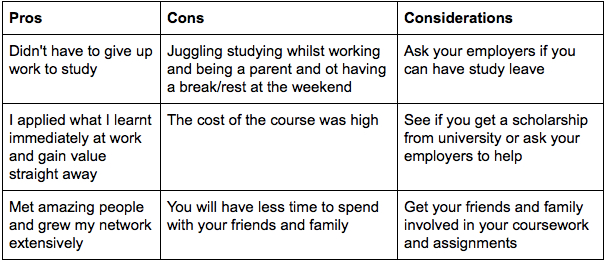Completing a Master’s Degree can be very rewarding but will also involve juggling your priorities. It is important to consider the advantages and disadvantages before you jump in and make a plan to manage your time in order to make the most of your experience.

Advantages
- You will learn in a structured way with a routine and deadlines to maintain momentum and motivation.
- An internationally recognised and respected academic qualification, deepening your knowledge and acquiring a specialist skill.
- The qualification is more than an academic title. It shows how determined and committed to your personal development you are. You need excellent time management and self-discipline to complete a Masters Degree.
- You will study with and meet like-minded people. The network of contacts you build at University can last a lifetime and could lead to networking opportunities that secure employment later.
- You will stand out from the competition when looking for roles – helping you find a job. Statistics suggest that people with a master’s are more likely to find work, but such figures should be treated with caution

Disadvantages
- The cost – it isn’t cheap! A Master’s degree in Computer Science will cost around £10,000 in the UK and between $12,000 – $25,000 per year in the United States.
- Spending an extra year or two at University when you could be learning on the job. Theory is great, but there is nothing better than learning from experience.
- Although a Masters degree will make you stand out in the job market, it is not a must-have. Most employers look for a mixture of experience and soft skills when hiring. The extra qualification is no guarantee to get paid more for a graduate role either.
Considerations
Think about the best way to study, as there are many different options nowadays! Each approach has its pros and cons. Check which options your chosen University offers.
- Part-times courses tend to have more experienced students with 5 years + experience.
- Full-time courses tend to attract a more international cohort.
- Distance learning you are unlikely to meet others face-to-face but can study when it suits you.
In addition, check the entry requirements, to ensure you can apply. Most Universities require a First or strong Upper Second class honours degree or an overseas equivalent in order to apply for a Master. English speaking countries normally expect that all students be proficient in spoken and written English and will be expected to provide evidence such as IELTS.
You will need the support of your friends and family too, as you will be spending at least 10-20 hours a week studying rather than being with them!
My view
I have very recently completed an Executive Master’s in Business Administration (MBA) with the University of Surrey around a full-time job, which had its pros and cons.

Completing a Masters Degree a little later in life at 35, meant I had more experience to relate my learning to. This meant I could use the time to stocktake and assess my career option and next steps as well. A large part of my Master’s Degree involved professional and career development and support, which was of great benefit. Check what extracurricular option your university provides as they could be more valuable than the qualification itself!
All in all…
Think about why you want to complete a Master’s Degree. The quest to study and enhance your career prospects is a big commitment and also a risk but can be a worthy investment.
Find out more at your local university or attend a University Fair. Alternatively, if you want to explore technical courses instead of University consider these top ten coding bootcamps in Europe or the USA.
About the author

Claire Donald VP of Engineering at Moo








